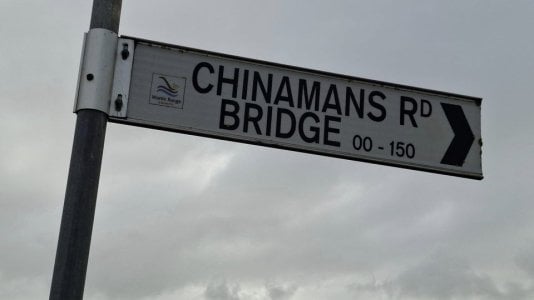Is Your Town's Street Name Sparking Outrage? See Why This South Australian Lane is Causing a Stir!
- Replies 56
In the quaint town of Penola, nestled in South Australia's southeast, a debate has been simmering that touches on the sensitive issues of history, heritage, and cultural sensitivity. At the heart of this debate is a road by the name of Chinamans Lane, a name that has recently been thrust into the spotlight due to concerns over its appropriateness in today's society.
The issue was brought to the fore when a new resident of Chinamans Lane reached out to the Wattle Range Council with a request to change the road's name, citing it as 'offensive' and expressing discomfort when sharing the address with others, especially Asian Australians. The resident's plea sparked a conversation about the legacy of such historical names and whether they should be preserved or reconsidered.
Despite the concerns raised, the Wattle Range Council voted unanimously to retain the name of Chinamans Lane. The decision was not made lightly; it was influenced by the area's historical connection to Chinese migrants during the gold rush era. In the 1850s, 19,000 Chinese gold-seekers traversed the route from Robe to the Victorian goldfields, with a Chinese market garden operating in the area to cater to their needs. Mayor Des Noll emphasized the importance of preserving this piece of Penola's history within the community.

The council's decision was met with mixed reactions. Some residents and descendants of early Chinese migrants, like Ian Gordon-Hansen, whose grandfather was among the first Chinese settlers in the region, supported the decision. They argue that the name is a nod to the Chinese community's contributions and that perhaps a more fitting tribute would be to provide historical context at the site rather than erasing the name altogether.
On the other hand, academics like Dr. Sophie Loy-Wilson, a senior lecturer in Australian history at the University of Sydney, argue that the term 'Chinaman' has long been recognized as offensive, not just in Australia but globally. Dr. Loy-Wilson suggests that using a nationality to name a place, rather than an individual's name, erases personal identity and fails to acknowledge the individual contributions of Chinese migrants.
The debate over Chinamans Lane is part of a broader conversation about how we honor our past while being mindful of the language we use and the potential for it to cause harm. It raises questions about how we balance the desire to preserve history with the need to reflect contemporary values of inclusivity and respect.
As members of the Seniors Discount Club, many of you have witnessed the evolution of societal norms and the ways in which language and recognition have changed over the years. We invite you to share your thoughts on this matter. Have you encountered similar situations in your own communities? How do you think we should address historical names that may no longer be in step with modern sensibilities?

Let's open up the discussion. Comment below with your experiences and opinions on whether historical street names should be retained for the sake of heritage or reconsidered to align with today's values. Your insights are not only valuable but essential in navigating these complex cultural landscapes.
The issue was brought to the fore when a new resident of Chinamans Lane reached out to the Wattle Range Council with a request to change the road's name, citing it as 'offensive' and expressing discomfort when sharing the address with others, especially Asian Australians. The resident's plea sparked a conversation about the legacy of such historical names and whether they should be preserved or reconsidered.
Despite the concerns raised, the Wattle Range Council voted unanimously to retain the name of Chinamans Lane. The decision was not made lightly; it was influenced by the area's historical connection to Chinese migrants during the gold rush era. In the 1850s, 19,000 Chinese gold-seekers traversed the route from Robe to the Victorian goldfields, with a Chinese market garden operating in the area to cater to their needs. Mayor Des Noll emphasized the importance of preserving this piece of Penola's history within the community.

A South Australian council voted to keep the name Chinamans Lane in Penola, despite its offensive connotation. Credit: Facebook / The SE Voice
The council's decision was met with mixed reactions. Some residents and descendants of early Chinese migrants, like Ian Gordon-Hansen, whose grandfather was among the first Chinese settlers in the region, supported the decision. They argue that the name is a nod to the Chinese community's contributions and that perhaps a more fitting tribute would be to provide historical context at the site rather than erasing the name altogether.
On the other hand, academics like Dr. Sophie Loy-Wilson, a senior lecturer in Australian history at the University of Sydney, argue that the term 'Chinaman' has long been recognized as offensive, not just in Australia but globally. Dr. Loy-Wilson suggests that using a nationality to name a place, rather than an individual's name, erases personal identity and fails to acknowledge the individual contributions of Chinese migrants.
The debate over Chinamans Lane is part of a broader conversation about how we honor our past while being mindful of the language we use and the potential for it to cause harm. It raises questions about how we balance the desire to preserve history with the need to reflect contemporary values of inclusivity and respect.
As members of the Seniors Discount Club, many of you have witnessed the evolution of societal norms and the ways in which language and recognition have changed over the years. We invite you to share your thoughts on this matter. Have you encountered similar situations in your own communities? How do you think we should address historical names that may no longer be in step with modern sensibilities?
Key Takeaways
- A South Australian council has voted to retain the name of Chinamans Lane in Penola despite it being called an offensive term.
- A new resident had requested the name change due to its racial connotations, particularly when addressing Asian Australians.
- Local history and community feedback influenced the council's unanimous decision to maintain the historical name.
- There is a debate over whether the name should be changed or if additional context and tributes to the Chinese community could be a better approach.
Last edited:








